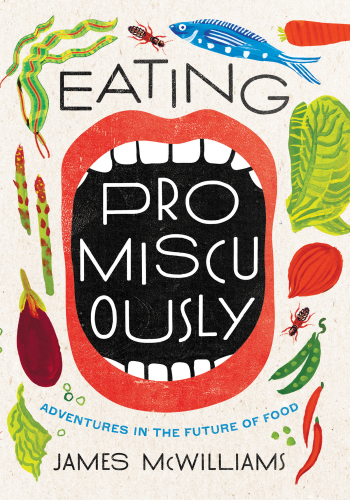
Eating Promiscuously
Adventures in the Future of Food
- اطلاعات
- نقد و بررسی
- دیدگاه کاربران
نقد و بررسی

March 15, 2017
A food writer and historian argues that humans would be healthier with a more diverse diet.McWilliams (History/Texas State Univ.; The Modern Savage: Our Unthinking Decision to Eat Animals, 2015, etc.) continues the attack on foodies, locavores, highbrow restaurants, and agribusiness's -corn-soy-sugar-animal complex- that he mounted in previous books. Here, the author profiles quirky individuals who are -pursuing peripheral culinary goals- that -have the potential to revolutionize how we think about the human diet.- The author's overriding assumption is that it would be better for people, animals, and the environment if our diets were more diversified. Hundreds of plants and protein sources, he rightly notes, are overlooked in favor of a narrow range of food. McWilliams hopes for a -global food system that's accessible, flexible, abundant, sustainable, healthy, humane, and resourceful.- How that ideal could be achieved is left to readers' imaginations. The author champions the bonobo, which eats a diverse array of plants, insects, grubs, and shellfish, and cavemen, who hunted and foraged for all their food. McWilliams begins by focusing on the Reeds, obese parents and son who have been victimized, he contends, by -a food system that rendered them emotionally depressed, physically sick, and socially ostracized.- Determined to lose weight, they embarked on a diet and exercise program and achieved success within a short time. However, as the author acknowledges, their struggle will be lifelong, embedded as they are in a food culture intent on undermining them. Among others profiled are a family that exists on foraged plants and venison, felled with a bow and arrow; a man who gathers and sells seaweed; an insect farmer promoting the nutritional value of bugs; oyster farmers; and a motley group of freegans, who forage among trash bags outside of markets and restaurants. Sadly, writes the author, over 40 percent of food in America is thrown out.McWilliams presents a solid argument, though it is not as radical or inspiring as he may have hoped, and the book could use more focused attention on creating the ideal world the author envisions.
COPYRIGHT(2017) Kirkus Reviews, ALL RIGHTS RESERVED.

May 1, 2017
As the planet experiences environmental shifts brought on by evolutionary change, climate change, and shifts in both animal and human populations, the need to reexamine assumptions about how we feed ourselves becomes ever more important. McWilliams does not shy from imagining radical solutions to these issues. He points out that contemporary industrial agriculture has restricted to a mere handful the numbers of edible grains that people consume. McWilliams envisions a time when a greater variety of all sorts of vegetables and fruits will crowd the dinner table. While anticipating more variety of plants in our diets, he believes animal products should be reducedto zero. He visits an insect farmer to find alternative animal protein sources from bugs, and he offers an argument that even vegans ought to consider insects for permissible eating. McWilliams deplores food waste, too, and investigates retrieving edibles from castoffs. Sure to be controversial.(Reprinted with permission of Booklist, copyright 2017, American Library Association.)




دیدگاه کاربران